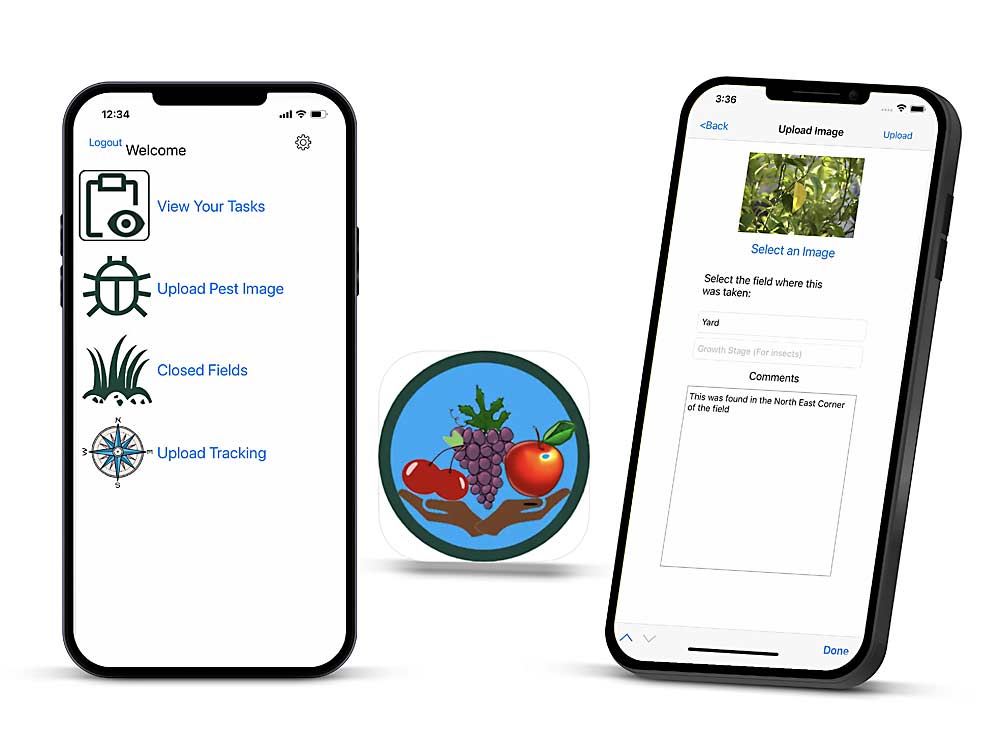
A new app designed to help Michigan grape growers simplify the pesticide application process will, hopefully, make it safer and more sustainable, too.
The Sustainable Ag Management Tool offers multiple functions. It can help users select pesticides that have less impact on human health and the environment, by comparing product options for a given disease, for example. It also helps users plan ahead and communicate tasks with workers, facilitate insect scouting and field observations, and keep track of spray and weather records, said Michigan State University associate professor Karen Chou, who led the team that designed the online application.
Chou, who specializes in toxicology and nutrition, said the app’s focus on pesticide risk is fairly unusual. It’s currently in the beta testing stage, with a handful of growers trying it out, looking for problems and providing suggestions. The designers plan to launch it as a free service next year.
The app can be accessed online at: sustainableag.msu.edu. Managers can use it to plan annual sprays and monitor task progress via computer, while workers in the field can access the app on their smartphones to learn their next task, Chou said.
Southwest Michigan wine grape growers Sidney Finan and her husband, Maxx Eichberg, have been testing the app this season in their 15-acre vineyard.
“We haven’t needed to use all the features yet, given how small we are, but it’s pretty cool,” Finan said.
They were using the app to keep spray logs and estimate spray efficacy. The app’s GPS function can predict how spray molecules move through the vineyard, based on wind and weather conditions, to assess the productiveness of the coverage, Finan said.
Their vineyard, Stranger Wine Co., isn’t certified organic, but their approach to farming is regenerative, low-intervention and biological. The fact that Chou’s app supports that is encouraging, said Finan, who also is chair of the Michigan Wine Collaborative’s (MWC) sustainability committee.
“We’ve seen through our vineyard that you can move away from conventional inputs and be effective,” Finan said. “The app encourages a look at less interventions.”
MWC, a nonprofit group that promotes the state’s wine industry, first approached Chou a few years ago about assessing pesticide risks. Both parties quickly realized the complex data needed to be delivered in a simplified and digital form to be of real use to growers. So, the assessment morphed into the creation of a digital management tool.
MWC, with guidance from Oregon’s LIVE and New York’s VineBalance sustainability programs, is creating a sustainability certification program that will be adapted to Michigan viticulture. When finished, the program’s sustainability criteria will be included in the app, helping growers adhere to the new standards, Chou said.
The sustainable-ag app will be “tangible, free, and easy to use, and will integrate other certification criteria, allowing growers to look at best practices,” Finan said.
MWC President Gina Shay recently introduced the collaborative’s burgeoning sustainability standards and MSU’s Sustainable Ag Management Tool to about 40 wine industry representatives and academics from across the country. Many expressed an interest in using the app when it becomes more widely available, she said.
To ensure the app’s long-term viability, it will eventually have to expand beyond Michigan wine grapes into other regions and crops, said Steve Kluemper, an agricultural consultant and MSU Research Foundation mentor who’s helping Chou develop a business plan for the app.
MWC, the Michigan Department of Agriculture and Rural Development, the MSU Research Foundation and the university’s Michigan Translational Research and Commercialization Innovation Hub for AgBio all provided funding for the project, Kluemper said.
—by Matt Milkovich






Leave A Comment